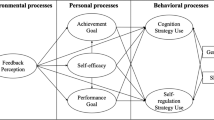Abstract
Goal orientation theory predicts that adopting a mastery goal will facilitate self-regulated learning and that endorsement of relative ability goals or extrinsic goals will be negatively related to self-regulated learning. Most empirical research has supported this general principle (see Ames, 1992 for review). However, some recent research suggests that, contrary to normative goal theory predictions, adoption of a relative ability goal can facilitate self-regulated learning in middle school students (Wolters, Yu, & Pintrich, 1996). This study found that, in line with normative goal theory predictions, adopting a mastery goal where the student focuses on learning was positively related to self-efficacy, use of deeper processing strategies, and metacognitive strategies. At the same time, adopting an extrinsic goal, where the student focuses on grades or rewards, was negatively related to efficacy and strategy use, again in line with goal theory predictions. However, contrary to goal theory, students who adopted a relative ability goal, where the student is focused on besting others, also had higher levels of self-efficacy, strategy use and metacognition. These results were interpreted in terms of a general social cognitive model of self-regulated learning where focusing on social comparison can provide important feedback for self-regulatory purposes as well as help maintain motivation in the face of often over-learned and boring classroom tasks.
Access this chapter
Tax calculation will be finalised at checkout
Purchases are for personal use only
Preview
Unable to display preview. Download preview PDF.
Similar content being viewed by others
References
Ames, C. (1992). Classrooms: Goals, structures, and student motivation. Journal of Educational Psychology, 84, 261–271.
Anderman, E., & Maehr, M. (1994). Motivation and schooling in the middle grades. Review of Educational Research, 64, 287–309.
Bouffard, T., Boisvert, J., Vezeau, C., & Larouche, C. (1995). The impact of goal orientation on self-regulation and performance among college students. British Journal of Educational Psychology, 65, 317–329.
Covington, M. (1992). Making the grade: A self-worth perspective on motivation and school reform. New York: Cambridge University Press.
Dweck, C., & Leggett, E. (1988). A social-cognitive approach to motivation and personality. Psychological Review, 95, 256–273.
Elliot, A., & Harackiewicz, J. (1996). Approach and avoidance achievement goals and intrinsic motivation: A mediational analysis. Journal of Personality and Social Psychology, 70, 461–475.
Garcia, T., & Pintrich, P. R. (1994). Regulating motivation and cognition in the classroom: The role of self-schemas and self-regulatory strategies. In D. H. Schunk & B. J. Zimmerman (Eds.), Self-regulation of learning and performance: Issues and educational applications (pp. 127–153). Hillsdale, NJ: Lawrence Erlbaum Associates.
Harackiewicz, J., Barron, K., & Elliot, A. (1998). Rethinking achievement goals: When are they adaptive for college students and why? Educational Psychologist,, 33, 1–21.
Pekrun, R. (1993). Facets of adolescents’ academic motivation: A longitudinal expectancy-value approach. In M. L. Maehr & P. R. Pintrich (Eds.), Advances in motivation and achievement: Motivation in adolescence (Vol. 8, pp. 139–189). Greenwich, CT: JAI Press.
Pintrich, P. R. (1994). Continuities and discontinuities: Future directions for research in educational psychology. Educational Psychologist, 29, 137–148.
Pintrich, P. R., & De Groot, E. (1990). Motivational and self-regulated learning components of classroom academic performance. Journal of Educational Psychology, 82, 33–40.
Pintrich, P. R., & Schunk, D. H. (1996). Motivation in education: Theory, research, and applications. Englewood Cliffs, NJ: Merrill Prentice Hall.
Pintrich, P. R., Smith, D., Garcia, T., & McKeachie, W. J. (1993). Reliability and predictive validity of the Motivated Strategies for Learning Questionnaire (MSLQ). Educational and Psychological Measurement, 53, 801–813.
Schiefele, U. (1991). Interest, learning, and motivation. Educational Psychologist, 26, 299–323.
Weiner, B. (1986). An attributional theory of motivation and emotion. New York: Springer-Verlag.
Wolters, C., Yu, S., & Pintrich, P. R. (1996). The relation between goal orientation and students’ motivational beliefs and self-regulated learning. Learning and Individual Differences, 8, 211–238.
Author information
Authors and Affiliations
Editor information
Editors and Affiliations
Rights and permissions
Copyright information
© 2001 Springer Science+Business Media New York
About this chapter
Cite this chapter
Pintrich, P.R., Zusho, A., Schiefele, U., Pekrun, R. (2001). Goal Orientation and Self-Regulated Learning in the College Classroom: A Cross-Cultural Comparison. In: Salili, F., Chiu, C.Y., Hong, Y.Y. (eds) Student Motivation. Plenum Series on Human Exceptionality. Springer, Boston, MA. https://doi.org/10.1007/978-1-4615-1273-8_8
Download citation
DOI: https://doi.org/10.1007/978-1-4615-1273-8_8
Publisher Name: Springer, Boston, MA
Print ISBN: 978-1-4613-5472-7
Online ISBN: 978-1-4615-1273-8
eBook Packages: Springer Book Archive




